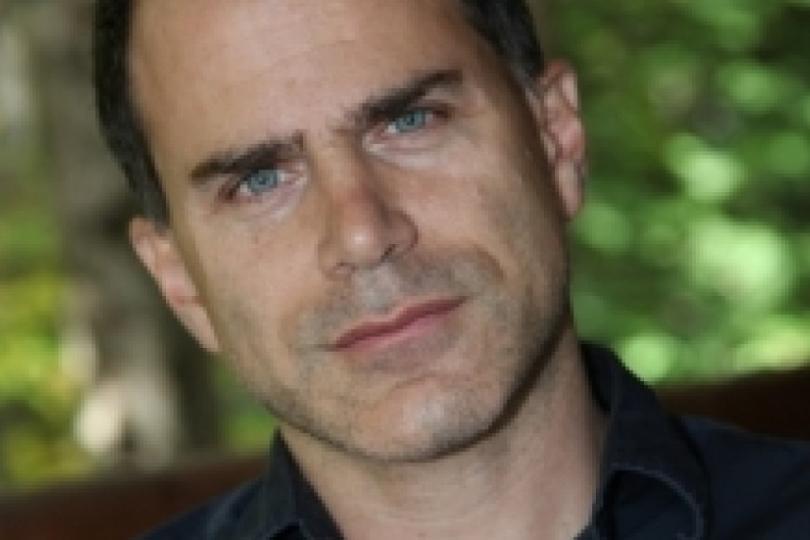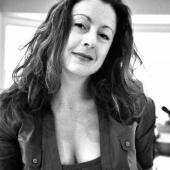A short chat with playwright Dominic Orlando
Editorial

In which the author manages to leave out all the ordinary details—vita, age of profile subject, basic bio, numerous awards, residencies, professional coups de gras, et al—and, having failed to gather this simple journalistic information due to a variety of factors inclusive of her own muddle-headedness, she instead provides you with this informative link and suggests you try to interview him yourself.
ON PROCESS
Q: How many plays have you written? “A lot.”
Q: A lot? “A lot of plays. I started writing plays when I was a kid.”
Q: Why plays? “I don’t know.”
We sit on opposite sides of an outdoor table at Spyhouse, at an impasse. Suddenly he informs me, with some intensity, “I should mention that I am not a napper. I don’t nap,” he says, as if to nap would be absurd. “But I just woke up from a nap.” He looks down at his mug and sort of clarifies by adding, “Which is why I got a hot chocolate.”
He looks both moderately apologetic and extremely suspicious, turning his head just slightly and gazing at me sidelong from the corner of his eye. Wishing to put him at ease, I happily make a mishmash of my questions and spit them out in their mangled totality, pausing only when I have run out of ways to dig the hole any deeper.
He studies me with his now slightly-narrowed blue left eye. I refrain from telling him I have a dog with a blue left eye, as well.
“I don’t understand your question,” he says flatly.
“I’ll rephrase.”
“Do.”
Obediently, I do. I rephrase, and repeat, the question I want very much for him to answer: Why does a person write plays?
Orlando nods briskly, clearly having grasped the fact that I am dim but well-meaning, and he says, “I think I do it because [theater] is the only form that incorporates all the other arts. And it’s live. I feel that it affects people’s brains in a different way than all the other art forms because the people are there. And even when there’s no music, it’s much more about rhythm, and movement, and the flow of action.”
I consider mentioning through-line and a book I like by Mamet, but fear Orlando’s raised eyebrow or wrath. Instead, I ask The Most Boring Question Ever Posed and Always Posed to Writers:
What’s your writing process?
“What do you mean?”
Wishing to weep, I say, Well, for example, do you start at the beginning? At the end? That sort of thing?
Again he nods, arms now folded across his chest. “I begin with a thread. There’s a book by Aaron Copeland called What to Listen for in Music—I tried to turn this into a class, but it didn’t work as a class because they were all looking at me like I was crazy—I feel like the way he explained symphonic composition is the thing that closest to playwriting, because he actually uses the word ‘theme,’ and talks about using connecting material—it really does lay out pretty well what I would describe as the playwriting process. I would say that plays have more in common with a large piece of music than they do with a novel.
“So,” he goes on, as I nod in agreement with generally everything, “I start with a thread, and it’s not usually a theme, it’s usually a situation. I’ve started teaching a little bit, and I’ve tried to impress upon my students that one of the most heinous things I think they do in teaching playwriting is separating character from plot, because there’s no such thing. The characters don’t exist outside the plot—it’s a ridiculous thing to think about. Even in your brain, those two things are locked together.
“So when I get an idea, it’s plot, character, and theme, all locked together, and it’s a very small idea. [He gestures as if holding a smallish thing, perhaps an egg, with his hands.] And then what happens is it accumulates or it doesn’t. I don’t take notes of ideas; I sort of see which ones accumulate and which ones don’t. And when it accumulates to a certain point, I’ll start writing.”
*
ON THE CAUSES OF NOT WRITING:
“I think the number one cause of not writing is spite. Actually. Unless people say they don’t have ideas. But then I usually say, well, then, you’re not a writer.”
He grins a devilish grin.
*
ON THE HISTORY OF DOMINIC ORLANDO’S PLAYWRITING CAREER, AND WHY HE IS NOT A NOVELIST
He started writing plays in sixth grade. Wrote a play instead of a science paper. (I forgot to ask what the play was about.) The play was presented to the class, and then to the two other sixth-grade science units, and then they wanted him to present it to the whole school.
“And then I walked into homeroom and everybody applauded,” he says, and sort of giggles. “So that was it, that sealed the deal. I got two days off of school and got applauded.”
In sixth grade, by comparison, most of us—well, I don’t know what you were doing, but I was shoplifting tampons.
Casually, he tosses out, “I also wrote novels in high school.”
I do not say so, but I think people who write novels in high school are inherently spooky.
“I think that I would be a novelist,” he says, “but I think that the social component of theater is important for me psychologically. I think that my brain just decided, You can sit around for half the days of the year, but not all of them.”
*
OBSERVATION
As I sit transcribing the interview, I press the headphones closer to my head, trying to make out the source of the sound of a steady thumping. Upon closer examination, the thumping is not steady, as in regular; it is steady as in constant, but constantly changing, from one complex time signature to another, and finally I realize that it is the sound of Orlando’s hands tapping out the rhythm of his thoughts on the metal table on which my tape recorder sat while we spoke; the thumping continues for the duration of the conversation.
*
FOR WHOM DOMINIC ORLANDO WRITES
Q: Do you have an audience in your head when you write? A critic? A reader?
Pause. Orlando waits, perhaps hoping I will again wrap my sentences around my feet and throat and flail a little more.
Or [I say, laughing apologetically] is that just me?
“I don’t write for an audience,” he says finally, and I am relieved that I have been saved from lying down on the sidewalk to die of embarrassment, reciting my favorite Eliot lines, shouting, “and when I am sprawling on a pin,/ when I am pinned and wriggling on the wall…” but thank God we’ll not have me shouting poetry, which I hardly think would make matters better; instead Orlando continues, “I think who I have in my head, unfortunately for me, is the Broadway audience of the 70s—which was extremely adventurous and eclectic and broad. And we have what people consider a tribal audience now, but I would submit that it’s not tribal, it’s marketing, and we’ve all turned into marketers. But I write for that imaginary audience that doesn’t exist anymore.”
Actually, I don’t agree. I told him as much. Thence ensued a conversation regarding New York, the fact that there is an Applebee’s in Times Square and other grievous facts, San Francisco, the San Francisco of the 70s, and why playwrights tend to drink bourbon. This latter was not clarified for me.
So what is it with playwrights? What is a stereotypical playwright?
Orlando tells this tale: at the MacDowell Colony, they bring you your lunch in a basket. One day, he goes to breakfast, [“because I like breakfast”], runs into Julia Jordon, they have breakfast, start talking, have a little coffee, have a little more coffee, keep talking, and then their lunch boxes are plunked down in front of them “with just a little bit of attitude. And that’s it,” he says. “That’s the stereotypical playwright. I think if playwrights had their way, that’s what they would do. They would sit with coffee, and then later on at night with bourbon, and talk. If there was a way to make a living doing that, that’s what they would do.”
The novelists at MacDowell, he notes, “were really strange. Really strange.”
*
ON AUTOBIOGRAPHY AND DISGUISE
“I believe in imaginative autobiography. I’m kind of big on the disguise aspect of theater, and I think it’s for everybody. One of my biggest philosophical issues with performance art…is that they’re supposed to be telling you the truth, or that they’re really themselves. I feel it’s kind of dishonest, because nobody is themselves. Once you walk on that stage, you’re not yourself, and the whole point is, that’s the point. You can just be something else and say something else and do something else, as not-yourself. I think that’s the same thing with writing—I think everything you write should be autobiography, in a way.”
But, I say, many people say that their work is not autobiographical, that that are not writing about themselves, and I always wonder how they get under their characters’ skin. What do you think?
He looks thoughtfully up into the falling leaves. “Well, there are levels of hackery, I suppose.”
*
ON HOW ENDINGS ARE JUST ENDINGS AND THAT IS THAT
“It’s like people telling me that A SHORT PLAY ABOUT 9/11 should be longer, and I’m like, Well, it’d be great if it was longer, but there’s no more play. I don’t know how else to explain it. The play stopped. I don’t have more play.”
Dominic Orlando’s new play ALL THAT IS SOLID MELTS INTO AIR is a part of this year’s Playlabs Festival at the Playwrights’ Center, and will run Tuesday 10/18 and Friday 10/21 at 7pm.
Profiles of Playlabs playwrights Winter Miller (THE ARRIVAL) and Sarah Gubbins (THE WATER PLAY) will run here during Playlabs.




